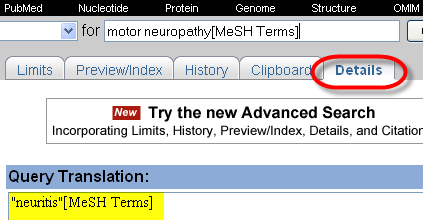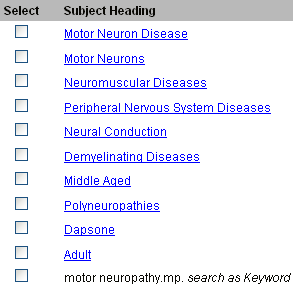 Almost a year ago (June 2008) I discussed PubMed’s Advanced Search Beta in a series entitled PubMed: Past, Present and Future. At that time I was not particularly impressed by disliked Advanced Search Beta and I still do.
Almost a year ago (June 2008) I discussed PubMed’s Advanced Search Beta in a series entitled PubMed: Past, Present and Future. At that time I was not particularly impressed by disliked Advanced Search Beta and I still do.
November last year some of its features have improved: like the addition of a Clear Button, Focused Queries, providing links to the Clinical Queries and Special Queries pages, and the author/journal search has been extended with optional fields so that it looks more like the valuable Single Citation Mapper in the blue side bar of the Basic PubMed page. And there is a link to the MeSH-database (see NLM Technical Bulletin November 2008).
Although these are real improvements, the links to the Queries and to the MeSH database are inconspicuous, at the end of the page below all kind of limits. My major objections to the Advanced Search is that people are more inclined to narrow their search by using as many limits as possible (because these are so prominently present) and that the MeSH cannot be easily looked up and/or are wrongly translated. Previously I gave some examples, where lung cancer[mesh] was searched, whereas the MeSH is lung neoplasms, or where recurrent pregnancy loss[MeSH] returns no result, because the term is habitual abortion (see previous post).
I avoid Advanced Search as long as I can, but the problem is, the library-users don’t. They like to experiment, especially when they consider themselves as advanced searchers.
Last month a Neurologist asked me if I could check his search for a Diagnostic Systematic Review. A search for a Systematic Review should be comprehensive and thus contain both MeSH-terms (Controlled terms of MEDLINE) and free text words (tw).
He was a resident in Neurology for 5 years and knew how to search PubMed.
Below is the first part of his search.
((((((((motor neuropathy[MeSH Terms] OR motor neuron[tw] OR motor neuropathy[tw]) OR multifocal motor neuropathy[tw]) OR demyelinating neuropathy[tw]) OR multifocal demyelinating motor neuropathy[tw]) OR neuropathy[tw]) OR neuropathies[tw]) AND (((((((((((((((((((((((((…..
Grosso modo it looked all right and well structured. The awful number of brackets is often seen when people combine directly in PubMed (although I was already glad there were no brackets around every single word and he didn’t copy the entire translation from the Details-Tab). And some terms were superfluous: you don’t have to search for multiword terms with neuropathy (i.e. motor neuropathy) because these are already found by searching neuropathy.
So we made the search simpler, like this:
(motor neuropathy[MeSH Terms] OR motor neuron[tw] OR neuropathy[tw]) OR neuropathies[tw]) AND (………
Just to be sure I asked him: “Do you mind if we check the MeSH? Motor Neuropathy looks just fine, but you never know.”
To my surprise, typing motor neuropathy in the MeSH search bar yielded 4 suggestions, none of which was motor neuropathy.
The most suitable term appeared Neuritis. When bringing this MeSH-term to PubMed we got exactly the same number of hits as with Motor Neuropathy. Mere coincidence? No, the hits weren’t any different (#1 NOT #4 giving zero results).
Looking Up the Query Translation under the Details Tab confirmed my suspicion: motor neuropathy[mesh] was translated as “neuritis”[MeSH]. This is disturbing. Not only doesn’t there exist any MeSH specific for motor neuropathy, people are put on the wrong track since it looks like motor neuropathy[mesh] is recognized as such.
Then it came to my mind that I had seen a similar odd “translation” when using PubMed Advanced Search (see above). And I asked him: “Did you by any chance use the Advanced Search”, which he did.
To check this I searched in Advanced Search for the MeSH: motor neuropathy. And, yes indeed, the motor neuropathy[MeSH] was searched so it seemed. (in reality we now know: Neuritis was searched). The difference with searching the MeSH database is that here I know that I search for neuritis (I choose to), whereas the Advanced search misleads me by suggesting I’m searching for motor neuropathy.
Why do I bother? Why don’t I just use motor neuropathy[mesh]. First because I don’t get what I want: I get neuritis[mesh] not neuropathy! Second, and most important, because it is not the most appropriate MeSH-term.
To find more appropriate MeSH I use a trick. I look for MeSH-terms assigned to articles, having motor neuropathy in their title, assuming that motor neuropathy is an important aspect of those papers.
Of the 379 hits found in GoPubMed, 219 were categorized as Motor Neuron Disease, 153 as Demyelinating Diseases and 145 as Polyneuropathies. These categories are MeSH term you can use for your search.
Similarly of the 380 references found in PubReminer, many papers were indexed with Motor Neuron Disease, Demyelinating Diseases, Polyneuropathies, peripheral nervous system diseases and motor neuron.
(Below are the number of papers, indexed with the indicated MESH in PubReminer; PubReminer shows the subheading coupled to the MeSH)
- 65 Motor Neuron Disease/diagnosis
- 32 Motor Neurons/physiology
- 26 Demyelinating Diseases/diagnosis
- 16 Peripheral nervous system diseases/diagnosis
- 8 Polyneuropathies
Using this approach we were able to set up a more complete search in PubMed. Remember it was the neurologist’s purpose to to an exhaustive search, for a less exhaustive search we would have only used motor neuropath* and perhaps motor neuron disease[mesh].
How different is it when you use the OVID interface for searching MEDLINE.
When you type Motor Neuropathy, several MeSH are suggested, many of which are useful:
When you click on Motor Neuron Disease, you see the hierarchal context and can choose which terms you would like to add. We choose not to explode Motor Neuron Disease, but only include one narrow term in our search: amyotrophic lateral sclerosis.
Finally the first part of the search in MEDLINE (OVID) looked like this. It is rather broad but the second part of the search (not shown) puts it into context.
1. motor neuron disease/ or amyotrophic lateral sclerosis/
2. exp Motor Neurons/
3. Demyelinating Diseases/
4. neuromuscular diseases/ or peripheral nervous system diseases/ or neuritis/ or polyneuropathies/
5. (neuropathy or neuropathies).tw.
6. motor neuron*.tw.
7. or/1-6
OVID MEDLINE was easier to use, you get what you see (and want) and the search is easier to save and edit. Furthermore the entire MEDLINE search can be easily transformed to a search in EMBASE: just replace MESH by EMBASE keywords.
I’m not happy with the Advanced Search for reasons explained above. I don’t find the altered mapping and citation sensor a success either. I don’t like that they removed the blue side bar in some display formats. And I’m really getting depressed by NLM’s announcement (November 2008):
PubMed Advanced Search will soon no longer be a beta site. It is now the place to go to use features such as field searching and limits. In the near future the tabs for Limits, Preview/Index, History, Clipboard, and Details will be removed from the basic PubMed pages. History, Limits, Index of Fields, and a link to Details are available from the Advanced Search screen. A link for the Clipboard appears to the right of the search box on the PubMed screen when the Clipboard has content.
If I understand it correctly this means that Pubmed Advanced Search is taking over the basic search.
It looks that my original idea was right: PubMed is going for the mass, it is going for the Google-like quick searches by people that don’t know much about MEDLINE and don’t want to learn it. But you have to know some basic principles to get the most out of subject searching. It is such a pity, that PubMed tries to copy its clones, whereas it holds all the trumps. No other 3rd party tools offer the same possibilities that PubMed offers, although they are more suitable for certain purposes (see examples of GoPubMed and PubReMiner above).
At least make two interfaces, one for the beginner (the present Advanced Search) and one for librarians and other people doing subject searches.
But I don’t have the illusion that the people of PubMed/NLM will listen to me and I’m not going to contact them for a 3rd time. PubMed’s route is determined, I guess.



















Good post. Advanced search is a mess… they could do a much better job with the interface… I think that goes without question. I’m not quite sure, though, why you’d want a more visible link to mesh, etc. Unless I’m missing your point, I don’t see what a more visible MESH link would do, since you’d still have to go there to run a query anyway. It’d be nice if they told you that the mesh term they were using was actually something else, but (when I care/remember to look) I just click on the “details” link, and see the translations made. Is that more what you’re looking for?
Granted, my searches seem simpler than your examples using Ovid, but I’m not sure I see your point about how PubMed is “copying its clones,” when it seems that they’re just trying to go simple (and for me, simple is usually good… if I have to use details, I can).
-jason
p.s. – Personally, I’m glad the blue bar is going… most of those links weren’t very useful.
[…] een aantal veranderingen doorgemaakt die niet allemaal gewaardeerd worden. Via Laika’s blog las ik al een kritiek en via het blogcarnival MedLib’s Round, First Edition op hetzelfde blog kwam ik terecht op […]
[…] Advanced Neuritis in PubMed (Laika’s MedLiblog) […]
[…] it will also mean that a complex search (when you need to look up MeSH) will take much longer. As discussed before, using “The Index of Fields in the Advanced Search” is not very suitable for this […]
[…] te hoeven kennen of opzoeken (voor een kanttekening hierbij zie het blog van Laika Spoetnik: ‘Advanced Neuritis in PubMed’). Maar nu in dit gedeelte van Advanced Search zo gestuurd wordt op citatiezoeken, zie ik mensen […]